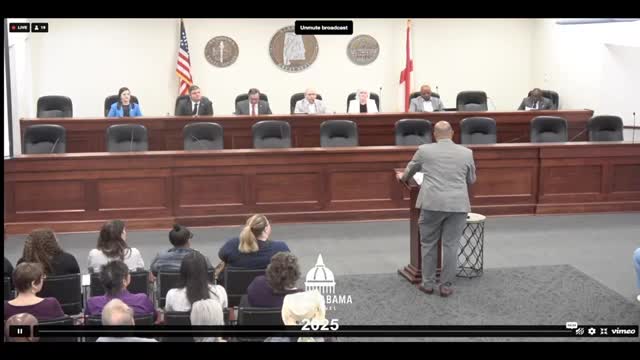Pastor urges expanded prison education, easier access for ministries and budget support
Get AI-powered insights, summaries, and transcripts
Subscribe
Summary
A prison ministry leader told the Joint Interim Committee on Corrections that increased in-cell study space, restored incentives and faster vetting for volunteers could reduce recidivism and improve outcomes for incarcerated people.
Dr. White, a pastor who leads a prison ministry, told the Joint Interim Committee on Corrections that improving access for faith- and community-based groups, restoring incentives and expanding educational opportunities inside cells should be treated as budget priorities.
Dr. White told legislators that many people in Alabama prisons read at about a fourth- or fifth-grade level and that adding classroom-style structure and study opportunities could reduce recidivism. “We have to do more to educate, those who are incarcerated,” he said. “It does far more for them to know that they're being prepared for things when it's time for them to be released.”
Why it matters: Committee members and witnesses framed education and volunteer access as both a corrections and a budget issue — arguing that better access and programming could change behavior inside facilities and improve post-release outcomes.
Dr. White said ministries currently visit facilities but that administrative hurdles limit how many volunteers can participate. He urged the Legislature to consider changes when reviewing the corrections budget, and recommended providing desk-style furniture so incarcerated people could study in cells as well as in libraries or classrooms. “One of the suggestions is that with the supermax prisons that are being built, that desks, bed desks be provided to where, those who are incarcerated will have study time even in, their cells,” he said.
He told the committee that incentives matter and that removing “good time” credits had reduced morale for some residents, making them less likely to participate in programming. Representative England asked whether morale had fallen since the removal of earned good-time credits; Dr. White said morale has dropped, adding that “when you incentivize good behavior, what it does is it gives hope.”
Dr. White also raised safety and trauma concerns, including sexual assaults, extortion and homelessness inside facilities. He described cases in which bunk theft or intimidation left people sleeping on floors, and said untreated trauma can lead people to reoffend. “Hurt people hurt people,” he said.
He requested clearer and faster processing of volunteer paperwork so more community groups can work inside prisons, and said ministries want to coordinate with educators. Dr. White noted vocational and GED programs as high priorities and recommended pairing classroom instruction with incentives and structured daily routines. He said community groups are prepared to submit budgets and program proposals when requested.
The pastor said his ministry visits facilities regularly and that ministry presence also supports corrections staff. “The minister the guards need to be ministered to,” he said, describing outreach to correctional officers as part of his work.
Ending: Committee members thanked Dr. White and noted the testimony will be considered alongside other corrections priorities as the panel prepares budget and policy recommendations.
